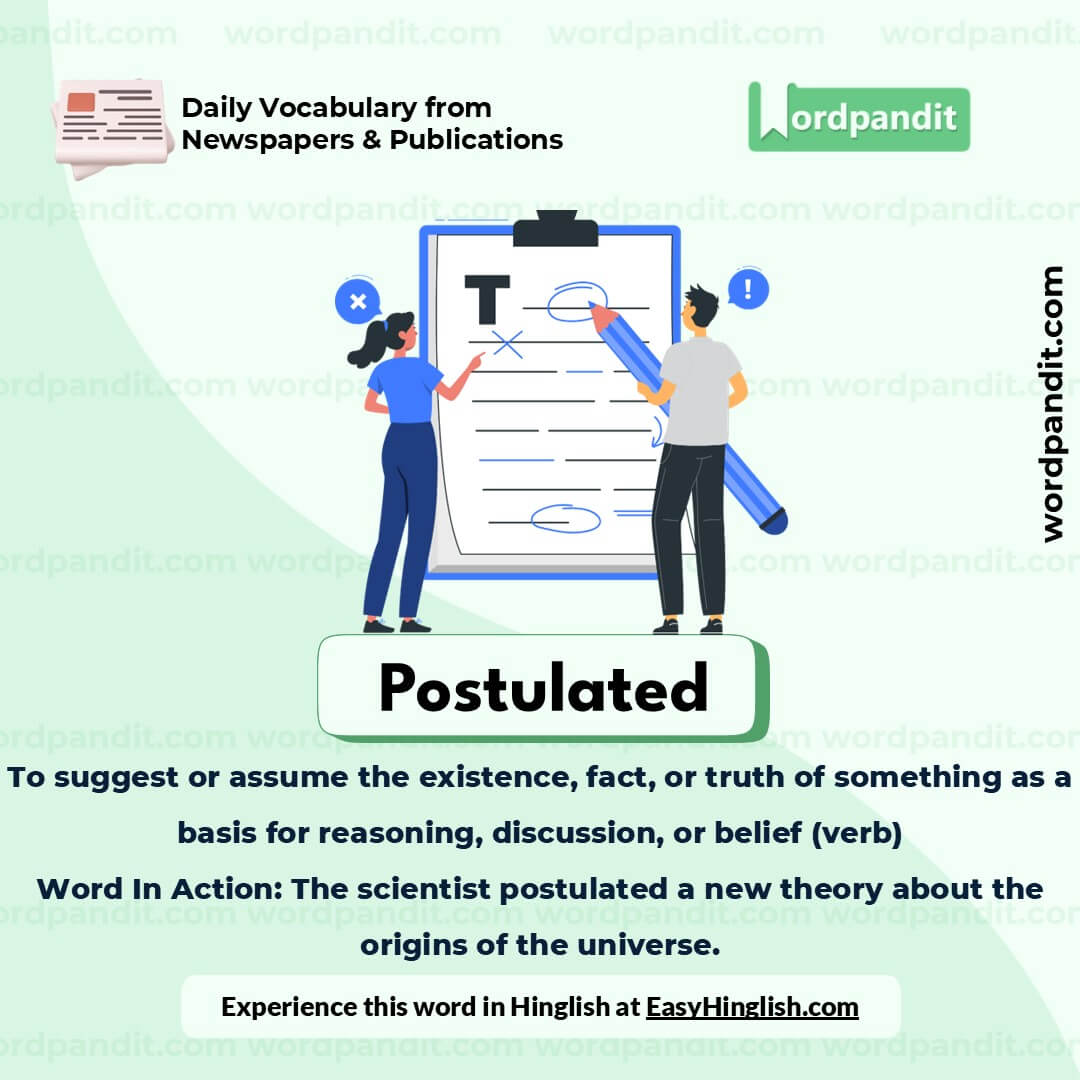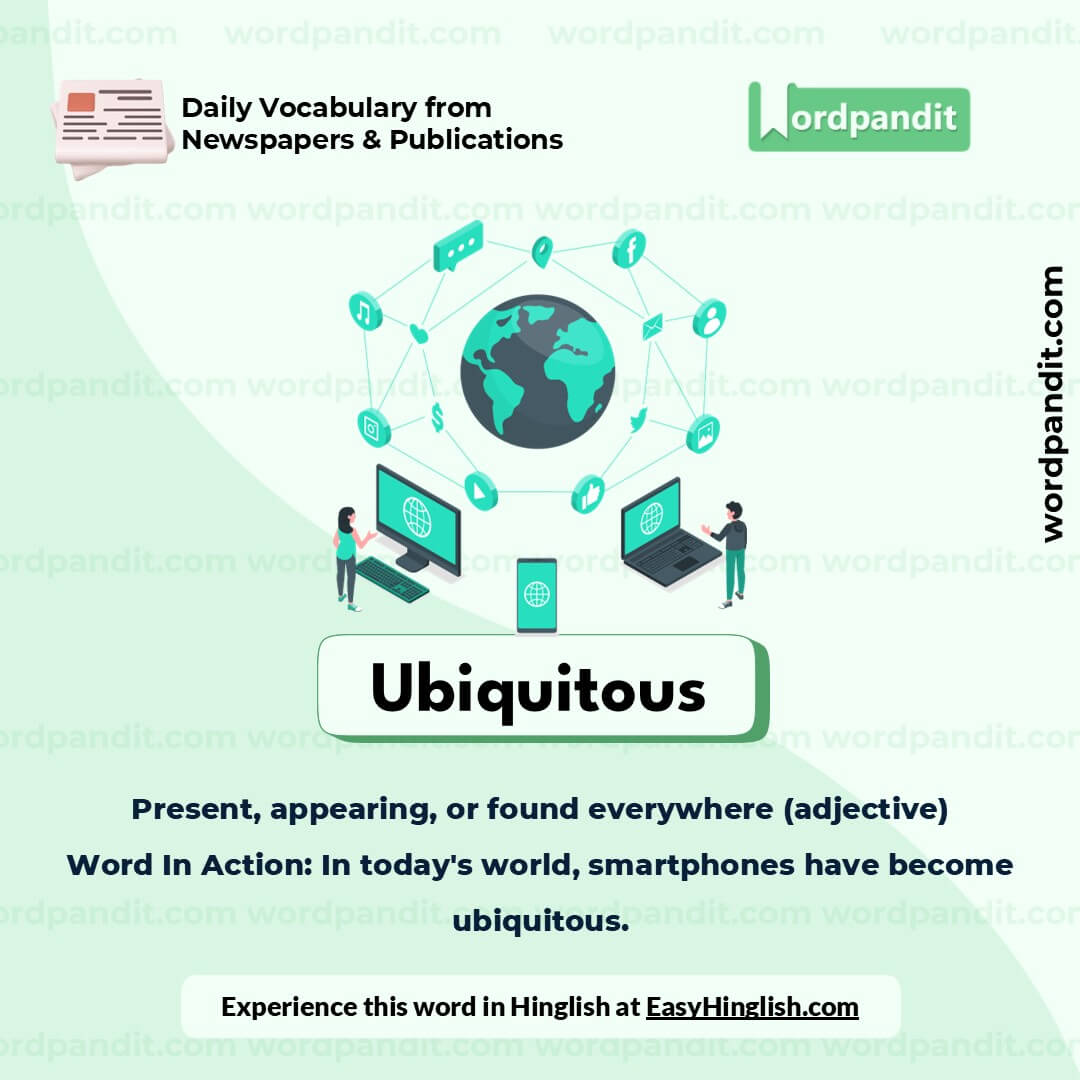Daily Vocabulary from Indian Newspapers and Publications
Welcome to Wordpandit’s Indian Vocabulary Hub
At Wordpandit, we understand the importance of staying rooted in the local context while expanding your language skills. This section focuses on enriching your vocabulary with words and phrases drawn from India’s leading newspapers and publications, ensuring you're learning vocabulary that is practical, relevant, and uniquely Indian.
Why Indian Sources Matter
We believe that the best way to master any language is by immersing yourself in local content. That’s why we carefully curate vocabulary from top Indian publications, including:
- The Hindu
- The Times of India
- The Economic Times
- Hindustan Times
- Live Mint
- The Indian Express
- And many others...
Stay Updated, Stay Relevant
With daily updates from Indian news sources, you’ll be consistently learning words that reflect the trends and shifts in Indian society and culture. Our focus is to provide vocabulary that enhances your understanding of the language in an Indian context.
How Wordpandit Supports Your Goals
Whether you’re preparing for exams, aiming to improve your professional communication, or simply want to stay connected with the latest Indian vocabulary, Wordpandit is here to guide you every step of the way.
Learn with a Practical Approach
Our interactive learning methodology includes real-world examples, engaging activities, and context-specific usage to ensure that every word becomes part of your active vocabulary.
Dive into Indian Vocabulary Today!
Why Choose Wordpandit?
Practical Learning: Focus on words you'll actually encounter in real-world reading, enhancing your comprehension and communication skills.
Diverse Content: From current affairs to scientific breakthroughs, our varied sources expose you to vocabulary across multiple domains.
Effortless Integration: Make Wordpandit a part of your daily routine. Just a few minutes each day can significantly boost your lexicon over time.
Your Path to Vocabulary Mastery
- Visit our Daily Vocabulary section regularly
- Explore new words and their usage in context
- Practice incorporating these words into your own writing and speech
- Track your progress as your vocabulary expands
Start Your Journey Today
Embark on your vocabulary enhancement journey with Wordpandit. By consistently engaging with our daily posts, you'll build a robust vocabulary that serves you well in academic, professional, and personal contexts.
Remember, a word a day keeps linguistic limitations at bay. Make Wordpandit your daily companion in the quest for vocabulary excellence!
WORD-1: Postulated
Context:
"The majority opinion authored by Chief Justice of India D.Y. Chandrachud said the interpretation that every privately-owned property could be used by the state as material resource to 'subserve the common good' postulated a 'rigid economic theory which advocates greater state control of private resources'." - The Hindu
Explanatory Paragraph:
The term postulated refers to the act of assuming or suggesting something as a foundational basis for further reasoning or discussion. In legal and philosophical contexts, it often implies proposing an idea as a starting point, even if it’s not fully proven, to explore its implications or build upon it logically.
Meaning: To suggest or assume the existence, fact, or truth of something as a basis for reasoning, discussion, or belief (verb)
Pronunciation: POS-chuh-lay-tid
Difficulty Level: ⭐⭐⭐ (Intermediate)
Etymology: From Latin postulatus, meaning "demanded" or "asked for"; the past participle of postulare meaning "to request"
Synonyms & Antonyms:
Synonyms: assume, hypothesize, posit, propose, theorize
Antonyms: deny, refute, disprove, reject
Usage Examples:
- Scientists have postulated that life may exist on other planets.
- Philosophers have long postulated the existence of a universal moral truth.
- The theory postulates that human behavior is largely influenced by societal norms.
- He postulated that increasing the budget for education would yield better outcomes for society.
Cultural Reference:
"Einstein postulated that the laws of physics are the same for all non-accelerating observers, which led to his theory of relativity." - Albert Einstein's Theory of Relativity
Think About It:
What are some ideas or beliefs you hold that are postulated but not yet proven? How do they influence your worldview?
Quick Activity:
Think of a common societal belief. Try to write a sentence that postulates an assumption about it, explaining its potential implications.
Memory Tip:
Remember "postulated" by thinking of a "post" or starting point on which other ideas are "mounted" or built upon.
Real-World Application:
The concept of "postulating" is useful in debates, science, and law, where forming a hypothesis or assumption can drive further exploration or analysis, even without complete evidence.
WORD-2: Ambivalence
Context:
"But, instead, he ended up creating ambivalence about what he really stood for." - Times of India
Explanatory Paragraph:
The word ambivalence refers to the state of having mixed feelings or contradictory emotions about someone or something. When a person is ambivalent, they may feel both positive and negative emotions simultaneously, making it hard to reach a clear decision or stance. This word is commonly used to describe emotional uncertainty or the difficulty of committing to a single point of view.
Meaning: The state of having mixed or contradictory feelings about something or someone (noun)
Pronunciation: am-BIV-uh-luhns
Difficulty Level: ⭐⭐⭐ (Intermediate)
Etymology: From Latin ambi- meaning "both" and valentia meaning "strength" or "power"; first used in the early 20th century
Synonyms & Antonyms:
Synonyms: uncertainty, indecision, hesitation, conflicted feelings
Antonyms: certainty, decisiveness, confidence, conviction
Usage Examples:
- She felt ambivalence about moving to a new city, torn between excitement and fear of the unknown.
- The company’s inconsistent policies led to ambivalence among employees.
- His ambivalence towards the job offer made it difficult for him to commit.
- They expressed ambivalence about the political candidate, unsure whether to support or oppose him.
Cultural Reference:
"In Hamlet, Shakespeare presents the theme of ambivalence through the character's constant indecision, showcasing the struggle of conflicting emotions." - Shakespeare's *Hamlet*
Think About It:
Why might someone feel ambivalent about a decision or commitment? How can ambivalence affect relationships or goals?
Quick Activity:
Write about a time when you felt ambivalent about a decision. What were the conflicting feelings involved, and how did you eventually decide?
Memory Tip:
Think of "ambi-" as "both" and "valence" as "feelings" to remember ambivalence as holding two opposing feelings at once.
Real-World Application:
Ambivalence is a common experience in making complex decisions, especially in relationships, career choices, and political opinions, where opposing values or priorities may compete.
WORD-3: Inalienable
Context:
"Life and personal liberty are inalienable to human existence." - Times of India
Explanatory Paragraph:
The word inalienable refers to something that cannot be taken away, surrendered, or transferred. Inalienable rights, such as the right to life and liberty, are considered fundamental and essential, intrinsic to the human condition and thus cannot be revoked or forfeited by any external force or authority.
Meaning: Unable to be taken away, given up, or transferred to another (adjective)
Pronunciation: in-AY-lee-uh-nuh-buhl
Difficulty Level: ⭐⭐⭐ (Intermediate)
Etymology: From Latin inalienabilis, combining in- meaning "not" and alienare meaning "to transfer ownership"
Synonyms & Antonyms:
Synonyms: inviolable, absolute, inherent, unassailable
Antonyms: transferable, alienable, revocable, forfeitable
Usage Examples:
- The constitution declares certain rights as inalienable, such as freedom of speech.
- Human dignity and respect are considered inalienable aspects of one’s existence.
- The right to privacy is an inalienable component of personal freedom.
- Many believe that freedom and justice are inalienable to a thriving democracy.
Cultural Reference:
"We hold these truths to be self-evident, that all men are created equal, that they are endowed by their Creator with certain inalienable rights..." - United States Declaration of Independence
Think About It:
What are some other rights or qualities you consider inalienable? Why should certain rights be protected as inalienable?
Quick Activity:
Identify three rights or freedoms you believe are inalienable, and explain why they are essential to human dignity.
Memory Tip:
Think of "inalienable" as "in" + "alien" + "able"—rights that cannot be alienated or separated from you.
Real-World Application:
The concept of inalienable rights is fundamental in discussions on human rights, law, and ethics, emphasizing protections that cannot be compromised by legal or social systems.
WORD-4: Voracious
Context:
"A voracious reader, he constantly shares his insights with those he mentors." - Money Control
Explanatory Paragraph:
The term voracious describes an intense eagerness or insatiable desire, typically referring to an appetite for food, knowledge, or activity. A voracious person pursues their interests with great enthusiasm and consumes information, books, or experiences eagerly and in large amounts.
Meaning: Having a very eager approach to an activity; consuming large amounts of something, especially food or information (adjective)
Pronunciation: vuh-RAY-shuhs
Difficulty Level: ⭐⭐⭐ (Intermediate)
Etymology: From Latin vorax, meaning "devouring" or "greedy," derived from vorare, "to swallow"
Synonyms & Antonyms:
Synonyms: insatiable, ravenous, avid, unquenchable, eager
Antonyms: apathetic, indifferent, satisfied, unenthusiastic
Usage Examples:
- She has a voracious appetite for learning and spends hours reading every day.
- His voracious curiosity about history led him to read countless books on the subject.
- The athlete maintained a voracious workout schedule to stay in top shape.
- They were voracious travelers, exploring new countries every year with great enthusiasm.
Cultural Reference:
"A voracious reader is often seen as a lifelong learner, constantly expanding their horizons and broadening their perspective on the world." - Common perception of avid readers
Think About It:
What topics or activities make you feel voracious? How does your enthusiasm for them affect those around you?
Quick Activity:
List three things you’re most voracious about, whether it’s a subject you love to study, a hobby, or an activity, and explain why you feel so eager about them.
Memory Tip:
Think of "voracious" as "very eager" to help remember its meaning of intense enthusiasm or appetite.
Real-World Application:
The word "voracious" is commonly used to describe avid readers or learners, as well as people who have an intense interest in any particular area, highlighting their unrelenting passion.
WORD-5: Ubiquitous
Context:
"Ubiquitous access to the Internet, e-commerce logistic infrastructure and UPI-driven fin-tech backend have created railroads for a rural digital economy." - Economic Times
Explanatory Paragraph:
The word ubiquitous describes something that is present or available everywhere, seemingly all at once. In modern contexts, it often refers to technology or services that have become so common that they’re accessible nearly anywhere, such as the Internet, mobile phones, or certain software applications.
Meaning: Present, appearing, or found everywhere (adjective)
Pronunciation: yoo-BIK-wih-tuhs
Difficulty Level: ⭐⭐⭐ (Intermediate)
Etymology: From Latin ubique, meaning "everywhere," derived from ubi meaning "where"
Synonyms & Antonyms:
Synonyms: omnipresent, widespread, pervasive, universal
Antonyms: rare, scarce, infrequent, limited
Usage Examples:
- Smartphones have become so ubiquitous that it’s rare to see someone without one.
- Social media platforms are now ubiquitous, influencing all areas of life from news to entertainment.
- Face masks became ubiquitous during the pandemic as a public health necessity.
- With ubiquitous Wi-Fi, people can work from virtually anywhere.
Cultural Reference:
"The phrase 'Big Brother is watching you' from George Orwell's *1984* refers to the ubiquitous surveillance present in a dystopian society, symbolizing control and the lack of privacy." - George Orwell's *1984*
Think About It:
What modern technology or trend do you think will become ubiquitous in the next decade? How might it impact daily life?
Quick Activity:
Identify three things that have become ubiquitous in your life, and describe how they influence your daily routines or interactions.
Memory Tip:
Think of "ubiquitous" as "everywhere" to remember that it refers to something present or common in all places.
Real-World Application:
The word "ubiquitous" is often used to describe technologies or conveniences that have become so common they are found everywhere, like Wi-Fi, mobile networks, or GPS.


















